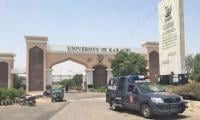Many clerics are in a state of denial over the COVID-19 crisis, with their resistance messages being shared in WhatsApp groups following the government’s move to restrict the number of worshippers to five persons at congregational prayers in mosques.
On the other hand, the religious scholars who are calling on their followers to worship at home instead of going to mosques are being subjected to a barrage of virulent criticism from fellow clerics.
“The pandemic has exposed the intellectual capacity of people from all walks of life; and our so-called religious intelligentsia is no exception,” says Dr Muhammad Arif Khan Saqi, chairman of the University of Karachi’s Department of Islamic Learning, while talking to The News.
In his opinion, this past Friday’s incident in which an incensed crowd attacked a police team for enforcing restrictions on congregational prayers at Liaquatabad’s Ghousia Masjid was the beginning of a potential crisis that could sabotage the efforts against the spread of the coronavirus.
“Among other reasons, such as financial anxiety and lockdown depression, a major cause of their violence appears to come from the talking of clerics against the lockdown restrictions for congregational prayers.”
To the query why people are not following the fatwas issued by noted religious scholars of all sects that people should pray at home, Dr Saqi takes a deep breath before speaking again. “Gone are the days when there was a central leadership in any sectarian group.”
Sub-sects within sects
Mufti Raghib Naeemi is one of the prominent religious scholars who have asked people to worship at home. He has a large following and carries on the legacy of his father Mufti Sarfraz Ahmed Naeemi Shaheed. However, it seems that eminent religious scholars are not opinion leaders for a large number of people.
“Since the lockdown started, we witnessed a sharp rise in the number of worshippers coming to mosques in our area,” says Hafiz Abbas Ansari, a resident of the Liaquatabad area. Ansari memorised the Holy Quran in a madrasa which follows Mufti Raghib Naeemi’s school of thought. He is a regular mosque-goer.
“My uncle would seldom go the mosque. But for over a week, he is there in most prayers along with his children,” Ansari says. “Instead of taking the precautionary measures being referred to by even our faith leaders, people appear to follow local clerics who talk against the restrictions on worshippers.”
Dr Saqi says the underlying problem is that “many clerics are feeling independent because of the power they are enjoying due to their social media reach. They think they are the true defenders of Islam and hence try to stand as unique”.
This is what is happening right now, he adds. “But they are not realising that by filling the people’s heads with ideas against the government’s lockdown move, they are putting everybody’s life in danger.”
Worshippers against imams
On March 27, some imams and mosque administrators had to deal with angry crowds of worshippers. In the morning, the law enforcement agencies sent notices to the mosque administrations that violation of the restriction order for Friday’s congregational prayers will lead to their arrests.
The mosque administrators who did not open the mosque gates at the time of the congregational prayers had to deal with angry crowds who wanted them to open the gates. On the other hand, a lot of mosques had a large number of worshippers attending the congregational prayers.
“When police arrested imams and mosque administrators the following day [on March 28] for holding the Friday congregational prayers, only then the people who were angry at us understood why we did not open the mosque gates for them and had the prayers with only five people inside the mosque,” says Zahid Khan, a committee member of a mosque in the city’s District East.
“This past Friday,” he says, “the law enforcers were present outside the mosque, knowing what kind of chaos we have had the Friday before that for not opening the mosque gates.” Khan says that since they don’t open the mosque gates at the time of the prayers these days, people are seen going to small mosques situated in narrow streets and inside apartment complexes.
“When police got the mosque closed inside a residential building this Friday, a group of residents held the congregational prayers outside the mosque in the building instead of praying at home.”
Faith and force
A security official says Rangers and police officials contacted “religious scholars having influence over people in their respective areas” after the incident of violence in Liaquatabad. The move was aimed at garnering their support.
“We too are Muslims. We pray five times a day. Yet some ignorant people are seeing us as anti-religion forces,” the official says. “We are doing long-hour duties, pushing our limits, putting our lives and the lives of our families in danger just to protect our people. It is heart-wrenching to see the propaganda against state institutions amid this grave crisis.”
In Dr Saqi’s opinion, the pandemic has brought the state an opportunity to reflect on its policies about the opening of new mosques and the influence of clerics on people. “The mosque affairs are the business of the state. In a post-corona world, the state must revise its policies on what I describe as the privatisation of mosques.”
Dr Saqi says the law enforcers cannot “go to every single mosque to ensure the lockdown restrictions”. “We are not only defying common sense but also going against the basic principles of sharia, one of which is to protect human lives. But since we have allowed every group to run privately-managed mosques, whatever is happening is no surprise to us. I can just pray for the state and people, since my opinion is considered too scholarly to be followed by majority of the religious people.”
This picture taken on January 30, 2023, shows commuters passing through the Empress Market in Pakistan's port city of...
An image of a performance at the ArchiGrooves: Beloved Tracks of Professional Architects’ Student Life, event...
Students and officials seen at the Al-Kawthar University in this representative image.— aku.edu.pk/File KARACHI: Al...
Syed Awais Qadir Shah, speaker of the Provincial Assembly of Sindh receiving a souvenir at the Consulate General of...
A view of an overloaded truck. — APP/FileThe National Highways & Motorway Police , South Zone, convened a meeting...
Sindhi nationalist leader GM Syed.— Facebook@abrarali.mangi.9/File HYDERABAD: The Sindh United Party on Friday...







